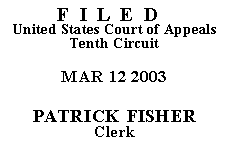

| JOHN PAUL HANEY, JR.,
v.
DAYTON J. POPPELL |
|
Pro se petitioner John Paul Haney, Jr., seeks a certificate of appealability (COA) to pursue his appeal of the district court's denial of his petition for a writ of habeas corpus filed pursuant to 28 U.S.C. § 2254. Determining that Mr. Haney has not met the statutory requirements, we deny his application and dismiss the appeal.
Mr. Haney was convicted by a jury in the Tulsa County District Court of the kidnaping and first-degree rape of a fourteen year-old girl. He was sentenced to two consecutive 140-year sentences. He appealed his conviction to the Oklahoma Court of Criminal Appeals (OCCA) on several grounds. The OCCA affirmed the judgment and sentence of the trial court. Mr. Haney filed an initial habeas petition, which the district court found to be a "mixed" petition, incorporating both exhausted and unexhausted claims. The district court permitted Mr. Haney to file an amended petition, which he did, asserting multiple grounds for relief. The district court denied the amended petition and declined to grant a COA. Mr. Haney appeals the district court's denial of the COA.
We first note that pro se complaints are held "to less stringent standards than formal pleadings drafted by lawyers." Haines v. Kerner, 404 U.S. 519, 520-21 (1972). To be entitled to a COA, Mr. Haney must make "a substantial showing of the denial of a constitutional right." 28 U.S.C. § 2253(c)(2). He can make this showing by establishing that "reasonable jurists could debate whether (or, for that matter, agree that) the petition should have been resolved in a different manner or that the issues presented were adequate to deserve encouragement to proceed further." Slack v. McDaniel, 529 U.S. 473, 484 (2000) (quotation omitted).
We may grant habeas relief only if the state court entered a judgment that
(1) resulted in a decision that was contrary to, or involved an unreasonable application of, clearly established Federal law, as determined by the Supreme Court of the United States; or
(2) resulted in a decision that was based on an unreasonable determination of the facts in light of the evidence presented in the State court proceeding.
28 U.S.C. § 2254(d).
Mr. Haney raises only one issue on appeal. He argues that he was deprived of his Sixth and Fourteenth Amendment rights because he was not afforded a fair and impartial jury. Mr. Haney moved in the trial court for a mistrial because two jurors, on their own initiative, told the trial judge that they worked at the same business as the victim's mother, and a third juror admitted having attended church with one of the State's witnesses. The trial court denied the motion.
A petitioner seeking habeas relief for denial of a fair trial before an impartial jury must satisfy the two-part test articulated in McDonough Power Equipment, Inc. v. Greenwood, 464 U.S. 548 (1984). The test requires the party to "demonstrate that a juror failed to answer honestly a material question on voire dire and then further show that a correct response would have provided a valid basis for a challenge for cause." Id. at 556 (emphasis added). We have held that this test "is not satisfied by showing that a juror provided a mistaken, though honest answer, but rather is directed at intentionally incorrect responses." United States v. Cerrato-Reyes, 176 F.3d 1253, 1259 (10th Cir. 1999) (internal citations and quotation omitted). The jurors in question brought the issue to the attention of the trial court on their own initiative, and Mr. Haney does not demonstrate or even assert that they made "intentionally incorrect responses" to the voire dire questions.
Mr. Haney has failed to raise a constitutional claim debatable by reasonable jurists. Mr. Haney's request for a certificate of appealability is therefore DENIED and the appeal is DISMISSED.
ENTERED FOR THE COURT,
Deanell Reece Tacha
Chief Circuit Judge
*.This order and judgment is not binding precedent, except under the doctrines of law of the case, res judicata, and collateral estoppel. This court generally disfavors the citation of orders and judgments; nevertheless, an order and judgment may be cited under the terms and conditions of 10th Cir. R. 36.3.